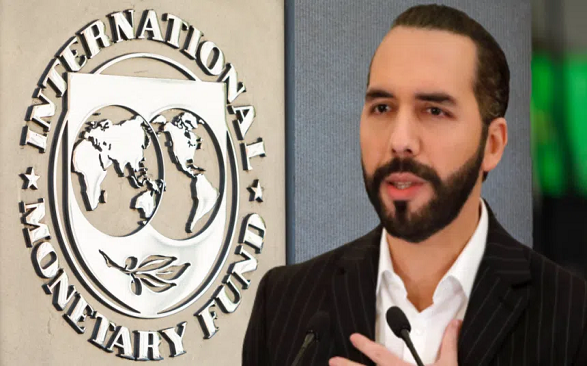by Jude Ayua
The International Monetary Fund (IMF) anticipates reaching an agreement with El Salvadorian authorities on the country’s Bitcoin law before January 2024. To enable El Salvador access to a $1.3bn IMF loan program, it has reportedly agreed to modify its law which legitimized bitcoin as legal tender in 2021, according to the Financial Times.
The modification of the law would include El Salvador removing a legal requirement for businesses to accept payment in bitcoin and making it voluntary. Additionally, “the government would also commit to reducing the budget deficit by 3.5 percentage points of GDP over three years with a mix of spending cuts and tax rises, passing an anti-corruption law and increasing reserves from $11bn to $15bn,” the report stated.
Read also: IMF wants El Salvador to review its Bitcoin Law to get funding.
The IMF’s pressure on El Salvador
Since the passing of the bitcoin law in 2021, the IMF has mounted pressure on El Salvador to review it. In a January 2022 statement, the IMF noted, “Efforts to improve financial inclusion are welcome, but Bitcoin use carries significant risks and Bitcoin should not be used as an official currency with legal tender status.” The Fund recommended “narrowing the scope of the Bitcoin law…strict regulation and supervisory oversight” to minimize “macroeconomic risks… fiscal, financial integrity and financial stability risks.”
In February 2023, the IMF issued a statement in which it emphasized “Bitcoin’s risks should be addressed.” It noted that “risks have not materialized due to the limited Bitcoin use so far,” adding that “underlying risks to financial integrity and stability, fiscal sustainability, and consumer protection persist, and … remain valid.” The IMF warned that:
“Financing purchases of Bitcoin by issuing tokenized securities should be eschewed because of fiscal risks. Given the legal risks, fiscal fragility and largely speculative nature of crypto markets, the authorities should reconsider their plans to expand government exposures to Bitcoin…”
Again, in August 2024, the IMF stated in a press release: “…while many of the risks have not yet materialized…further efforts are needed to enhance transparency and mitigate potential fiscal and financial stability risks from the Bitcoin project.”
Recently, during a press briefing on 3 October 2024, the IMF’s Director of Communications Department Julie Kozack, in response to a participant’s question on the IMF’s expectations on the use of Bitcoin as an official currency in El Salvador, explained: “What we have recommended is a narrowing of the scope of the Bitcoin law, strengthening the regulatory framework and oversight of the Bitcoin ecosystem and limiting the public sector exposure to Bitcoin.”
El Salvador’s Bitcoin gains
Since making bitcoin legal tender, El Salvador has consistently invested in it by adding 1 BTC daily to its treasury since November 2022 as a public policy. As of 4 December 2024, El Salvador’s BTC portfolio was $603,340,991.00, after BTC crossed $100,000, according to Salvadoran President Nayib Bukele’s post on X. Bukele shared in the post that the country’s unrealized gains amounted to more than $333.5 million on its $269,743,800.80 investments.
Read also: What is next for bitcoin after the $100,000 mark?
Pros and cons of the proposed agreement
El Salvador’s experience with the IMF since its Bitcoin law highlights the ongoing tension between innovation and regulatory oversight, which other nations exploring digital currencies can learn from.
The potential modification of El Salvador’s Bitcoin law offers it the opportunity to access the $1.3 billion IMF loan program, which could help to stabilize its economy, reduce fiscal deficits, and increase its reserves. The loan conditions, which include fiscal reforms and anti-corruption measures, could enhance governance and fiscal discipline. Also, making bitcoin payments voluntary for businesses will reduce burdens on them.
On the other hand, the proposed modifications imply reduced economic sovereignty, potentially discouraging bold policy innovations. Spending cuts and tax hikes could adversely impact low-income groups, while voluntary Bitcoin adoption might slow its integration and the associated benefits of blockchain technology.
Read also: Brazil proposes National Bitcoin Reserve Bill
There are also implications for Bitcoin. The IMF’s recommendation for stronger regulatory oversight and focus on financial stability could enhance trust in Bitcoin by reducing risks of fraud and speculative misuse, making adoption safer, more credible, and sustainable.
However, “scaling down” businesses’ mandatory acceptance of bitcoin payments may limit its accessibility for unbanked populations and hinder financial inclusion. The IMF’s criticism of bitcoin’s risks might also discourage other nations from adopting cryptocurrency as a tool for inclusion, stifling innovation in using crypto solutions to expand financial services for disadvantaged populations.
Read Also: Nigeria’s Investment and Securities Bill classifies virtual assets as securities.
Jude Ayua is a policy analyst at CAB. A lawyer, Jude is an associate at Infusion Lawyers where he is a member of the Blockchain & Virtual Assets Group. He is also a member of the Policy & Regulations Committee of the Stakeholders in Blockchain Technology Association of Nigeria (SiBAN). Jude reports and writes on crypto policy and regulations. jude@infusionlawyers.com
Discover more from Crypto Asset Buyer
Subscribe to get the latest posts sent to your email.




